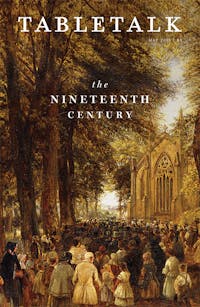
Request your free, three-month trial to Tabletalk magazine. You’ll receive the print issue monthly and gain immediate digital access to decades of archives. This trial is risk-free. No credit card required.
Try Tabletalk NowAlready receive Tabletalk magazine every month?
Verify your email address to gain unlimited access.
In eastern Europe, the years immediately after the fall of the Iron Curtain were tremendously difficult as countries and families transitioned from communism and socialism to some form of democracy and capitalism. With the plummeting value of the national currencies, banks failed and families lost their meager life savings. What began with celebration and anticipation collapsed into anger and despair. Once again, the promises of men failed to deliver the true peace and lasting security for which they had hungered.
This same story has repeated itself throughout history. Nations and systems arise on the wings of power and promise, and they pass from the scene just as assuredly as the setting sun.
Twenty centuries earlier, the Apostle Paul began a church-planting ministry in the thriving but declining city of Ephesus, a city with a deep history because of its location on a critical highway connecting the sea to the interior of Asia Minor and the eastern portion to the western portion of the Roman Empire. It featured the Temple of Artemis (four times the size of Athens’ Parthenon), where prostitution and fertility rituals were rampant. It is no wonder that this prosperous city, teeming with traveling merchants, sailors, and artisans, excelled in commerce, art, education—and marital infidelity. And that culture crept into the young church.
Is that not a description of America today: a center for art, culture, economy, and depravity? The needed message, both then and now, is the gospel of Jesus Christ proclaimed and lived out in the lives of faithful believers who make up the church. Nothing else will do. Nothing else can save. Nothing else will last.
How has the church managed to survive for all these centuries despite kingdoms’ rising and falling? The answer is simple but profound: faithfulness. Not the faithfulness of man, but the faithfulness of God to His promises. Though His promises are many, they are one: by His power and grace, He will be our God, and we will be His people. From the sending forth of Abraham with God’s promise that he would be the father of a great nation to His promise through Zechariah that the King would enter Jerusalem on a donkey; from His promise through Isaiah that His salvation would reach the ends of the earth to the angelic announcement that the Savior had come; from Jesus’ declaration that the Son of Man would be delivered up to death to His words through John’s revelation that He is alive forevermore—His promises are sure.
Our calling to be lights in the world and a city on hill is a divine commission to discover points of contact with the world, places where the message and ministry of Jesus Christ connect to the world’s desires, fears, and needs. The truth, beauty, and simplicity of the gospel is this: He is faithful. He is faithful to send His Word to lead us; faithful to send His Son to redeem us; faithful to send His Spirit to vivify, seal, and sanctify us. In the clutter and clatter of the world, one picture continues to resonate with the watching world: faithfulness.
We present God’s character of faithfulness in the honesty of our words and the integrity of our lives. But it stands out in one portrait in particular: marriage. When husband and wife declare on their wedding day that they “promise and covenant before God and these witnesses to be a loving and faithful spouse, in plenty and in want, in joy and in sorrow, in sickness and in health; as long as we both shall live,” they are promising to display to a watching world a divine attribute. But it only truly depicts God’s covenant faithfulness when we actually, by God’s enabling grace, live out those vows.
The magnificence of the marriage analogy in Scripture is that it presents both the completed and continuing aspects of the work of Christ. For example, consider Paul’s letter to the Ephesians. After exhorting his readers to sexual purity, he writes,
Husbands, love your wives, as Christ loved the church and gave himself up for her, that he might sanctify her, having cleansed her by the washing of water with the word, so that he might present the church to himself in splendor, without spot or wrinkle or any such thing, that she might be holy and without blemish. (5:25–27)
Christ has already given His life for the redemption of His bride, but the ministry of sanctification continues (“that he might sanctify her”) with a future goal (“that he might present the church to himself in splendor”). Those who are in biblically faithful marriages seek, in the shadow of Christ, to do the same: to faithfully, lovingly, gently, securely present the completed work of Christ and to be instruments of sanctification in the other’s life, through all seasons (“in plenty and in want, in joy and in sorrow, in sickness and in health”). The added blessing of our marital faithfulness is the hope we present to the watching world of the One who is Faithful and True.
In the Lord’s providence, the collapse of communism in Eastern Europe coincided with a tremendous ingathering of new believers into the church. As many heard the gospel for the first time, they discovered that a hope in Christ is far more life giving than any governmental system could ever be. Amazingly, that message of hope was delivered through a small but faithful church, reflecting and proclaiming the faithfulness of God in Jesus Christ.
